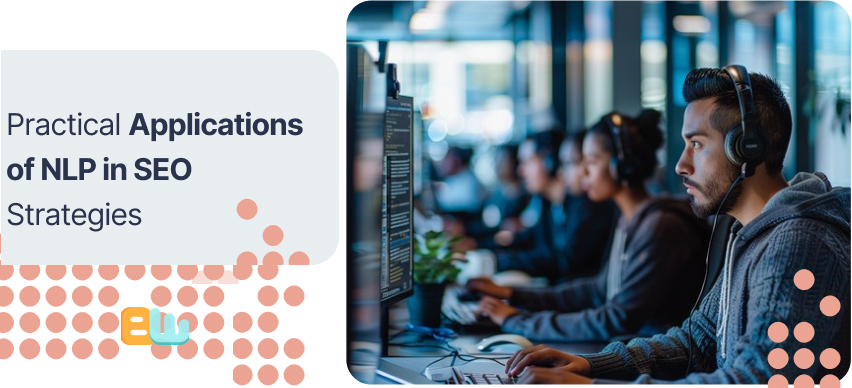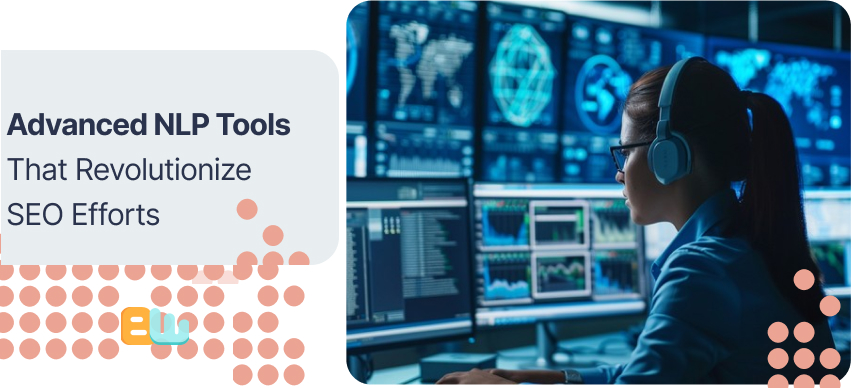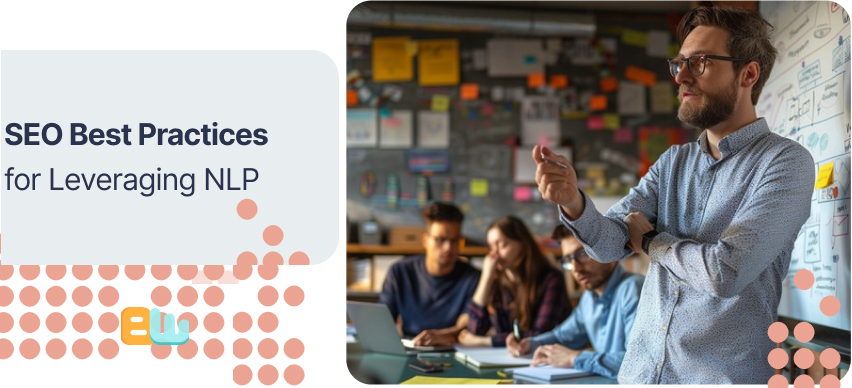
In today’s digital age, search engine optimization (SEO) has become vital for businesses to improve online visibility and attract organic traffic. Traditional SEO strategies focus on optimizing content for specific keywords to improve search engine rankings. However, with advancements in technology, the landscape of SEO has evolved. One such advancement is the integration of Natural Language Processing (NLP) into SEO strategies.
This blog will explore the evolution of SEO from simple keywords to complex conversations, highlighting the role of NLP in modern SEO. We will discuss how NLP transforms keyword research, enhances content relevance, improves user experience, and revolutionizes SEO efforts.
The Evolution of SEO: From Simple Keywords to Complex Conversations

In the early days of SEO, the primary focus was identifying and optimizing content for specific keywords to improve search engine rankings—keyword research involved manually analyzing keyword volumes and competition levels to identify relevant keywords for optimization. However, as search engines have become more sophisticated, SEO has evolved to consider factors beyond simple keyword matching.
The emergence of NLP has played a significant role in this evolution. NLP technologies like machine learning and natural language processing have enabled SEO professionals to understand user intent and create content that aligns with how people search and speak.
Understanding the Shift in SEO Dynamics
In the ever-changing landscape of digital marketing, it is crucial to understand the shift in SEO dynamics. Traditional SEO strategies focus on optimizing content solely for search engines, often ignoring the user experience. However, with the advent of NLP and the focus on user intent, SEO has transformed into a more user-centric approach.
By leveraging NLP, SEO professionals can gain valuable insights into user behavior, analyze search trends, and optimize content to improve search engine rankings. NLP allows for a deeper understanding of user intent, enabling the creation of content that resonates with users and delivers a seamless user experience. This shift in SEO dynamics has revolutionized how businesses approach search engine optimization, leading to next-level SEO success.
The Role of Natural Language Processing (NLP) in Modern SEO
In the modern era of SEO, natural language processing (NLP) is crucial in optimizing content for search engines and user experience. NLP enables SEO professionals to understand and interpret human language meaningfully, allowing them to create content that aligns with user intent and search engine algorithms.
NLP analyzes user behavior and trends to identify relevant keywords and search queries. By understanding the context and semantics of user queries, SEO professionals can optimize content to provide users with the most relevant and valuable information. This enhances the overall user experience and improves search engine rankings.
Unveiling the Power of NLP for SEO Success

NLP is a powerful tool that can revolutionize SEO strategies and take them to new heights. By understanding user intent, optimizing content for semantic relevance, and enhancing the overall user experience, NLP enables businesses to achieve SEO success like never before. In the following sections, we will explore how NLP transforms keyword research, enhances content relevance, and improves user experience.
How NLP Transforms Keyword Research
NLP has completely transformed the way keyword research is conducted in SEO. Traditionally, keyword research involved manually analyzing keyword volumes and competition levels to identify relevant keywords for optimization. However, keyword research has become more data-driven and accurate with AI-powered NLP tools.
NLP-powered keyword research tools can analyze search trends and identify relevant keywords based on user behavior and search queries. These tools can analyze vast amounts of search data, including historical search queries and real-time search trends, to uncover valuable insights about user behavior and intent.
Enhancing Content Relevance with NLP Techniques
NLP techniques play a significant role in enhancing content relevance for SEO. By analyzing user behavior and search trends, NLP can identify semantic relationships between words and phrases, allowing businesses to create content that aligns with user intent.
NLP-powered content optimization tools can analyze content structure, readability, and keyword density to ensure that content meets search engine algorithms’ requirements. These tools can also identify semantic relationships between words, helping businesses create content that resonates with their audience on a deeper level.
Improving User Experience Through Conversational AI
Conversational AI, powered by NLP, can significantly improve user experience in the context of SEO. Conversational AI refers to using AI technologies to simulate human conversation and interaction. By leveraging NLP, businesses can create conversational AI experiences that enhance user satisfaction and customer service.
One practical application of conversational AI in SEO is through chatbots and virtual assistants. NLP algorithms enable these AI-powered systems to understand and respond to user queries in a natural and contextually relevant manner. This improves user experience and provides valuable insights into user needs and preferences.
Practical Applications of NLP in SEO Strategies

NLP has a wide range of practical applications in SEO strategies. In the following sections, we will explore some of the key applications of NLP that can take your SEO efforts to the next level. We will discuss optimizing for voice search and digital assistants, crafting content that speaks to user intent, leveraging sentiment analysis for better engagement, and the advanced NLP tools that revolutionize SEO efforts.
Optimizing for Voice Search and Digital Assistants
With the rise of voice-activated devices and digital assistants like Siri and Alexa, voice search optimization has become crucial in SEO. NLP plays a pivotal role in understanding the conversational nature of voice queries and providing relevant search results.
NLP algorithms analyze the context and semantics of voice queries, allowing businesses to create content that answers natural, spoken questions. By optimizing for voice search, businesses can improve their chances of appearing in voice search results and provide a seamless user experience.
Crafting Content That Speaks to User Intent
Understanding user intent is crucial in creating content that resonates with users and search engines. NLP techniques enable businesses to analyze user queries and identify their underlying purpose.
Businesses should analyze user behavior, search trends, and other data points to gain insights into what users seek when crafting content. By understanding user intent and tailoring content accordingly, businesses can attract more organic traffic, improve user engagement, and enhance search engine rankings.
Leveraging Sentiment Analysis for Better Engagement
Sentiment analysis, powered by NLP, can be a valuable tool for improving user engagement in SEO. Sentiment analysis involves analyzing the sentiment or emotion behind user-generated content, such as social media posts and reviews.
NLP algorithms can analyze the language and context of user-generated content to determine the sentiment expressed. This information can help businesses gauge public opinion, identify trends, and tailor their content and marketing strategies accordingly.
Advanced NLP Tools That Revolutionize SEO Efforts

Advancements in NLP technology have led to the development of advanced tools that can revolutionize SEO efforts. In the following sections, we will explore some of these breakthrough NLP technologies and discuss how they can enhance your SEO strategies. We will also discuss integrating these NLP tools into your SEO toolbox, ensuring you stay ahead of the competition and achieve greater success in search engine rankings.
Breakthrough NLP Technologies for SEO Professionals
NLP technologies have significantly advanced in recent years, providing SEO professionals with powerful tools to enhance their strategies. These breakthrough NLP technologies can analyze vast amounts of data, identify patterns, and provide valuable insights into user behavior and search trends.
One such breakthrough technology is machine learning, which enables computers to learn from data and improve their performance over time. Machine learning algorithms can analyze user behavior, search queries, and website performance metrics to identify patterns and make predictions about search engine algorithms.
Integrating NLP Tools into Your SEO Toolbox
Integrating NLP tools into your SEO toolbox is crucial for staying ahead of the competition and achieving SEO success. These tools can provide valuable insights, automate tasks, and improve the overall efficiency of your SEO efforts.
Some essential NLP tools for SEO professionals include keyword research tools, sentiment analysis tools, content optimization tools, and chatbot platforms. These tools can help you analyze search trends, identify relevant keywords, optimize content for user intent, and enhance user experience through conversational AI. When integrating NLP tools into your SEO toolbox, choosing the right tools that align with your specific SEO goals and objectives is essential.
Measuring the Impact of NLP on SEO Performance

Measuring the impact of NLP on SEO performance is crucial for optimizing strategies and staying competitive in the digital landscape. By analyzing data and metrics, businesses can gain valuable insights into the effectiveness of NLP techniques and make data-driven decisions to improve their SEO performance.
Businesses can track several key performance indicators (KPIs) to measure NLP’s impact on SEO. These KPIs include organic search traffic, conversion rates, bounce rates, time on page, and search engine rankings. By monitoring these metrics, businesses can assess the effectiveness of their NLP-enhanced SEO strategies and identify areas for improvement.
Key Performance Indicators (KPIs) for NLP-Enhanced SEO
When measuring the impact of NLP on SEO performance, there are several key performance indicators (KPIs) that businesses should track. These KPIs provide valuable insights into the effectiveness of NLP-enhanced SEO strategies and help businesses make data-driven decisions.
Some key performance indicators for NLP-enhanced SEO include organic search traffic, conversion rates, bounce rates, time on page, and search engine rankings. By monitoring these KPIs, businesses can assess the impact of NLP techniques on their SEO performance and identify areas for improvement.
Analyzing and Interpreting SEO Metrics in the Age of NLP
Analyzing and interpreting SEO metrics in the age of NLP can be challenging due to the vast amount of data available. However, with the right tools and techniques, businesses can gain valuable insights into user behavior, search trends, and the overall performance of their NLP-enhanced SEO strategies.
Businesses can use tools like Google Analytics and other data analysis platforms to analyze and interpret SEO metrics effectively. These tools provide valuable insights into organic search traffic, user engagement, conversion rates, and other key metrics.
SEO Best Practices for Leveraging NLP

Leveraging NLP for SEO success requires following best practices that align with search engine algorithms, user intent, and content quality. In the following sections, we will discuss tips for crafting NLP-friendly content and guidelines for NLP optimization across various SEO aspects. Incorporating these best practices into your SEO strategies can enhance your organic traffic, user engagement, and rankings.
Tips for Crafting NLP-Friendly Content
Crafting NLP-friendly content is essential for optimizing your SEO strategies. Here are some tips to ensure that your content aligns with NLP techniques and resonates with users and search engines:
- Understand user intent: Analyze user queries and search trends to gain insights into what users seek. Craft your content to address their questions and needs effectively.
- Use natural language: Optimize your content for natural language by using natural-sounding sentences and phrases. This will align your content with how users search and speak.
- Provide valuable insights: Offer valuable and relevant information in your content to position yourself as a trusted authority in your niche. This will improve user engagement and search engine rankings.
- Optimize for semantic relevance: Leverage NLP techniques to identify semantic relationships between words and phrases. This will ensure your content is contextually relevant and resonates with user intent.
- Focus on readability: Create content that is easy to read and understand. Subheadings, bullet points, and concise sentences improve readability and user experience.
By following these tips, businesses can create NLP-friendly content that ranks well and delivers valuable and engaging information to users.
Conclusion
In the realm of SEO, the shift from keywords to conversations marks a significant evolution. Natural Language Processing (NLP) has emerged as a powerful tool, transforming how we approach SEO strategies. NLP revolutionizes the digital landscape by enhancing content relevance, optimizing for voice search, and boosting user engagement through conversational AI. Crafting NLP-friendly content and leveraging advanced NLP tools are key practices for SEO success in this new era. As businesses adapt to these changes, understanding the impact and potential of NLP in SEO is crucial for staying ahead in the ever-evolving digital sphere.
